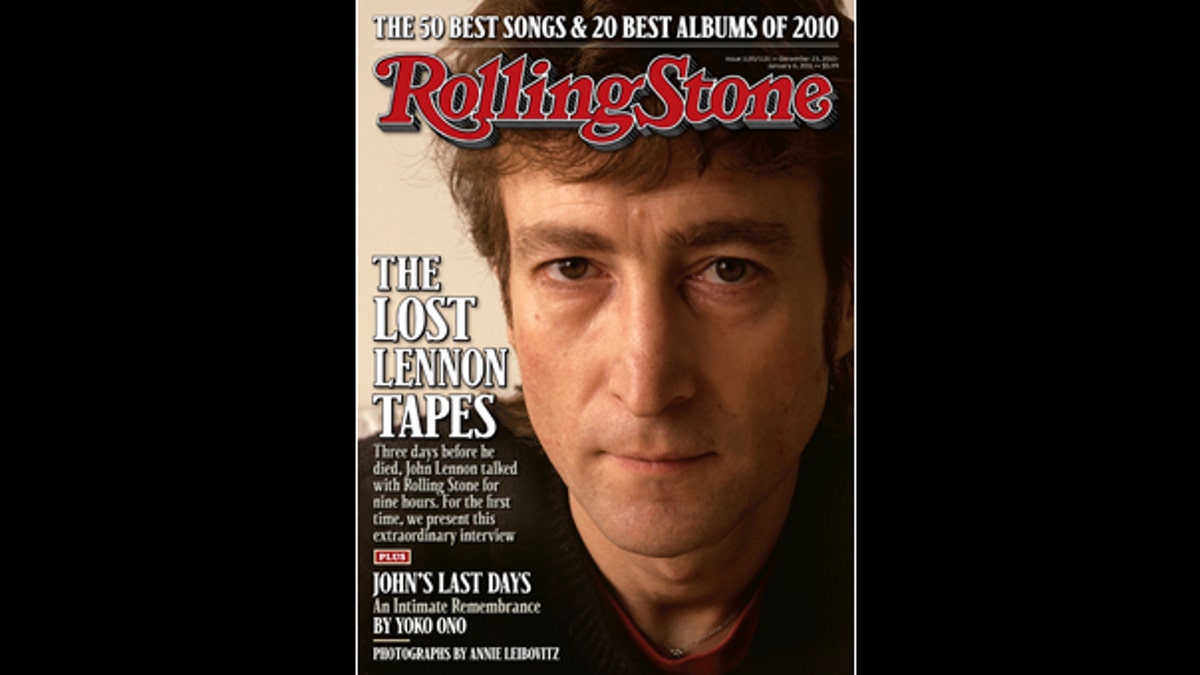
Former Beatle John Lennon is shown on the cover of the Dec. 23, 2010 issue of ‘Rolling Stone.’ (AP)
NEW YORK -- Three days before he was gunned down, John Lennon complained about his critics -- saying they were just interested in "dead heroes" -- and talked optimistically about his family and future, musing that he had "plenty of time" to accomplish some of his life goals.
Lennon's final interview was released to The Associated Press by Rolling Stone on Wednesday, the 30th anniversary of the musician's death. The issue using the full interview will be on magazine stands on Friday. While brief excerpts of Jonathan Cott's interview with Lennon were released for a 1980 Rolling Stone cover story days after Lennon's death, this is the first time the entire interview has been published.
"His words are totally joyous and vibrant and hopeful and subversive and fearless," said Cott in an interview on Tuesday. "He didn't mince words."
Lennon saves some of his harshest words for critics who were perennially disappointed with Lennon's path, in both music and in his life, after leaving the Beatles.
"These critics with the illusions they've created about artists -- it's like idol worship," he said. "They only like people when they're on their way up ... I cannot be on the way up again.
"What they want is dead heroes, like Sid Vicious and James Dean. I'm not interesting in being a dead (expletive) hero. ... So forget 'em, forget 'em."
He also predicted that Bruce Springsteen, then hailed as rock's bright future, would endure the same critical barbs: "And God help Bruce Springsteen when they decide he's no longer God. ... They'll turn on him, and I hope he survives it."
But Lennon also talked about trying to be a good father to his youngest son Sean, learning how to relate to a child (he admitted he wasn't good at play) and spoke of his strong bond with wife Yoko Ono: "I've selected to work with ... only two people: Paul McCartney and Yoko Ono. ... That ain't bad picking."
At 40, he was also reflective of what he had accomplished so far in life and exploring life's themes, and remained committed to his goal of peace and love on earth.
"I'm not claiming divinity. I've never claimed purity of soul. I've never claimed to have the answers to life. I only put out songs and answer questions as honestly as I can ... But I still believe in peace, love and understanding."
Cott interviewed Lennon at his apartment and at his record studio. The interview was originally planned for a cover story for Lennon and Ono's upcoming album "Double Fantasy," but in the rush to put out a story after Lennon was shot to death outside his apartment building by Mark David Chapman, only snippets were used.
Cott said he never went back to the three hours worth of tapes until a few months ago when he was cleaning out his closet.
"On a strip of magnetic tape, it was sort of a miracle that first of all, the tape had not degraded after 30 years," he said. "All of this sudden, this guy's voice, totally alive ... just made me feel so inspired that I felt that I should really transcribe the whole thing."
Cott said he was struck by how much Lennon was thinking about his life and mortality.
"There were a lot of strange consideration of where he was and what he felt like sort of in the middle of his journey," Cott said. "I think it was like a mid-life meditation, I was struck by that."
The magazine also included an essay by Ono recalling her final days with her husband.
Ono released a statement Tuesday night in tribute to Lennon.
"On this tragic anniversary please join me in remembering John with deep love and respect," Ono said. "In his short lived life of 40 years, he has given so much to the world. The world was lucky to have known him. We still learn so much from him today. John, I love you!"














































